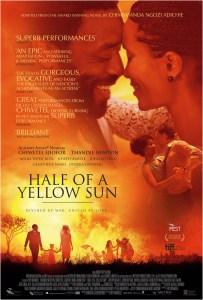 Half Of A Yellow Sun - a film adaptation of celebrated author Chimamanda Ngozi Adichie, already out in theaters in the UK and the USA was screened at the NollywoodWeek festival in Paris, last month. It’s an epic love story that weaves together the lives of four people swept up in the turbulence of civil war, during the struggle to establish an independant republic in Nigeria. We had the chance to meet its director, Biyi Bandele who came to Paris for the Black Movie Summer Festival. Our conversation was mainly about its adaptation of the novel, to the film and political reality in Nigeria.
Half Of A Yellow Sun - a film adaptation of celebrated author Chimamanda Ngozi Adichie, already out in theaters in the UK and the USA was screened at the NollywoodWeek festival in Paris, last month. It’s an epic love story that weaves together the lives of four people swept up in the turbulence of civil war, during the struggle to establish an independant republic in Nigeria. We had the chance to meet its director, Biyi Bandele who came to Paris for the Black Movie Summer Festival. Our conversation was mainly about its adaptation of the novel, to the film and political reality in Nigeria.
Half Of A yellow Sun avec Chiwatel Ejiofor (12 Years A Slave), Thantie Newton (The Pursuit of Happyness– Collision) et Anika Noni Rose (Dreamgirls) – l’adaptation cinématographique de l’auteur Chimamanda Ngozi Adichie, déjà sorti sur Grands écrans au Royaume-Uni et aux Etats-Unis, a été présenté pour la première fois, à Paris en juin dernier, au NollywoodWeek festival. Cette épopée amoureuse entrecroise la vie de quatre personnes emportées dans les tourbillons de la guerre de Biafra (1967-1970). pour établir une république indépendante au Nigéria. Nous avons eu la chance de rencontrer le réalisateur du film : Biyi Bandele qui était à Paris, Vendredi 27 juin, pour le Black Movie Summer Festival. Une rencontre principalement tournée sur l’adaptation de ce roman, mais aussi sur la réalité du contexte politique actuel du Nigéria…
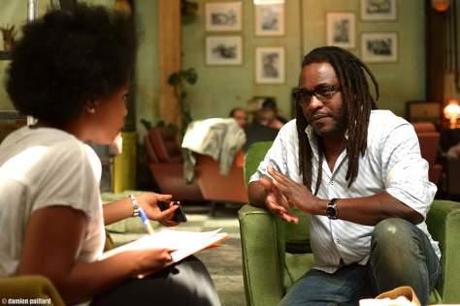
Diese Mag : Good afternoon Biyi, thank you so much for your time. Could you please introduce yourself to our readers ? Bonjour Biyi et merci pour votre temps ! Pouvez-vous vous présenter à nos lecteurs ?
Biyi Bandele : I am Biyi Bandele and I am a writer – director. I come from Nigeria, I live in London… I’m just directing my first picture movie « Half of a yellow sun ». It’s not the first feature I directed, I’ve been directing for around 25 years. I’ve done some short films before. Je suis Biyi Bandele, écrivain et réalisateur, je viens du Nigéria et je vis à Londres. Je viens de réaliser mon premier film intitulé « Half of a yellow sun », auparavant j’ai réalisé des courts-métrages.
So « Half of a yellow sun » is your first movie, a film based on a novel by Chimamanda Ngozi Adichie. Is it about the biafran war ? Donc Half of a Yellow Sun, qui est l’adaptation du roman de Chimamanda Ngozi Adichie est votre premier long-métrage. Est-ce qu’on peut dire que le sujet principal du film est la Guerre du Biafa ?
Well it’s not about the biafran war, Half of a yellow sun the novel starts in 1960 and ends in 1970, only 3 years of that decade are war years from 67 to 70, so you have 7 years that are not war years. It’s a novel which at the end of it has the battle of the nigerian civil war, the Biafra War and the film is the same thing. They are people who come see the movie and expected to see the start and end of the Biafran war, but it doesn’t because that’s not the book. It’s a real story about love, thats what attracted me to it, if Chimamanda book has been about soldiers on the war front I wouldn’t have done it. Not because I think there’s anything wrong with that but because the aspect of the biafran war doesn’t really interest me, for me it was like a celebration of all this people who went through the most powering experience that any human being could go through. I also liked Olanna (Thantie Newton) and Kainene (Anika Noni Rose), the two protagonistes, the twin sisters because they represented a class of africans men or women that you’ve never seen on the big screen before. Usually when you go watch movies about Africa especially in the english speaking world you find a movie where the principle character is a white guy who’s gonna save animals or africans, and the africans are there like in the background. I don’t have a problem with movies like that, the problem that I had was that was the only kind of movies that was allowed and the criticle establishment reacted really strongly to my movie either for or seriously against it. I thought sometimes like that they wanted to linch me because I was making this movie that doesn’t go by the rules. À vrai dire, ce n’est pas un film sur la guerre du Biafra, le roman « Half of a yellow sun » débute en 1960 et se termine en 1970. Durant cette période de 10 ans, seulement trois années sont consacrés à la guerre (de 1967 à 1970), les sept autres, ne les sont pas. Le roman n’aborde qu’à la fin la guerre civile du Biafra… tout comme le film. Il y a des gens qui viennent voir le film en pensant qu’ils verront le début et la fin de la guerre du Biafra, mais en fait non, car ça ne se passe pas comme ça dans le livre. C’est une vraie histoire d’amour et c’est ce qui m’a attiré. Si le roman de Chimamanda parlait des soldats pendant la guerre, je n’aurais pas fait le film. Non pas que je pense qu’il ait quelque de mauvais en cela, mais les aspects de la guerre ne m’intéresse pas. A mes yeux quand j’ai lu le roman, c’était plus comme une ode à toutes ces personnes qui ont vécu l’expérience la plus puissante qu’un être humain puisse traverser. J’ai d’ailleurs, aussi, beaucoup aimé les personnages de Olanna (Thantie Newton) et Kainene (Anika Noni Rose), les sœurs jumelles, parce qu’elles représentent une classe sociale d’africains que l’on ne voit pas au cinéma. La plupart du temps, quand on va voir un film sur l’Afrique, surtout dans le monde anglo-saxon, c’est souvent un film où le personnage principal est un blanc qui va sauver des animaux ou des africains, et les africains sont toujours en arrière plan. Je n’ai aucun problème avec ce genre de film, ce qui me gêne c’est que c’est le seul genre de film permis. Les critiques ont eu des réactions très vives à l’égard de mon film, que ce soit pour ou contre, mais j’ai parfois eu le sentiment qu’on me lynchait parce que mon film ne respectait pas leurs règles.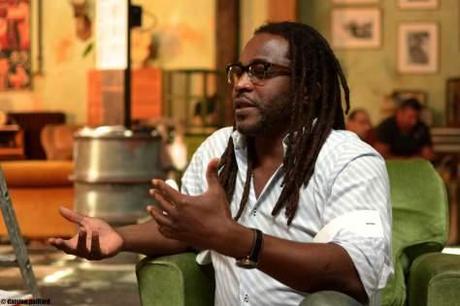
How do you turn a 500 pages book into a movie ? Comment avez-vous adapté un livre de 500 pages en film ?
As I said earlier, only 3 years of the story of the book was adapted in the movie. There’s actually more war in my movie than in the book. You won’t find everything from the 500 pages book in a 2 hour movie, if that’s what you’re looking for then you don’t go to the cinemas, you watch a tv series because you can’t do that, you can’t tell everything from the book (laughs). For me, it’s all about the essence of the book, my definition of that might be different from yours, but as a director I gotta make what I I beleive is the essence. And I’ve done that, I’m proud of the movie, it works, it was really really tough shooting it and incredible. Comme je l’ai dit auparavant, j’ai adapté que 3 ans de l’histoire raconté dans le livre. Je dirai même qu’il y a plus de guerre dans le film que dans le livre. Vous ne trouverez pas en 2 heures de film, tout ce qui est raconté dans les 500 pages du livre. Si c’est ce que vous recherchez, vous n’allez pas au cinéma, vous regardez des séries, parce que ce n’est pas faisable. On ne peut pas tout dire ! (Rires) Pour moi, c’est l’essence même du livre, ma vision est peut être différente de la votre, mais en tant que réalisateur, je dois faire ce qui me semble être l’essence du livre. C’est ce que j’ai fait, je suis fier du film, il fonctionne, ca a été très difficile et incroyable de le faire.
I believe it was mainly shoot in Nigeria, right ? Ce film a été tourné en grande partie au Nigéria, n’est-ce pas ?
We shoot all of it in Nigeria and just 3 days in London in a studio. Il a été entièrement filmé au Nigeria et juste 3 jours dans un studio à Londres.
As this is the biggest nigerian film ever, did the government helped you on the production part and during the making process ? Comme il s’agit du plus grand film nigérian jamais réalisé, est ce que le gouvernement vous a aidé pour la production ou pendant le tournage ?
They didn’t helped or not helped, basically the producers raised 80% of the money in Nigeria, that money was a loan from the bank, they took a mortgage. When you take a loan you have to pay it back (laughs) ! It wasn’t an investment from the bank even if it helped. Where we shoot in Calabar, the local government helped us a lot, they just made things easier, you know how it goes in Nigeria, everything is bureaucracy. If you don’t know the right person well let’s just say good luck. The goverment in Calabar was so so helpful and people were friendly, they wanted us to be there, we could feel it, that was great. On ne peut pas dire qu’ils ont aidé ou pas, ce sont les producteurs qui ont trouvé 80% des fonds au Nigeria, et cette argent c’est un prêt de la banque, ils ont pris un crédit. Quand tu prends un crédit, tu dois rembourser (rires) ! Ca n’a pas été un investissement de la part de la banque mais ça a aidé. Lorsque nous avons filmé à Calabar, les autorités locales nous ont beaucoup aidé, ils nous ont facilité la vie, vous savez comment ca se passe au Nigeria tout n’est que bureaucratie. Si vous ne connaissez pas la bonne personne… disons juste : bonne chance ! Les autorités de Calabar étaient tellement bienveillantes et les gens tellement sympathiques… ils voulaient de nous là-bas, on le sentait et ça c’était plutôt génial.
I can’t wait to see the movie tonight at the BMS opening. Is it a tribal perspective of the Biafra war ? What shall we expect ? J’ai hâte de voir le film ce soir à la soirée d’ouverture de la BMS. S’agit-il d’un point de vue tribal ou ethnique de cette guerre ? A quoi devons nous nous attendre ?
Well as you know the book was written by Chamamanda Ngozie Adichie who is Igbo so by definition, it’s a point of view of an Igbo writer. I’m Yoruba but it’s not my point of view, which is not to say that I reject her point of view. It’s still Chimamanda book, a Igbo writer’s version but told on the point of view of these characters who lived though the war. Comme vous le savez, le livre a été écrit par Chamamanda Ngozie Adichie qui est Igbo, donc forcément, c’est le point de vue d’une écrivaine Igbo. Moi je suis Yoruba, ce n‘est donc pas mon point de vue à moi, mais ça ne veut pas dire que j’ai rejeté le sien. C’est le livre de Chimamanda, une vision Igbo mais à travers des personnages qui ont vécu pendant la guerre.
How did you got this great cast on your movie (Chiwetel Ejiofor, Thandie Newton, Anika Noni Rose, Genevieve Nnaji), and not to mention that Thandie is really a great actress !! We love her style. Comment avez vous réussi à réunir ce beau casting pour votre film ? Thandie est une très grande actrice. Nous l’adorons.
You know as I’m a director I read people and Thandie, let’s say I have been a big fan of her work. The first movie she made, she was about 15 years old, it’s an australian movie, she worked with Nicole Kidman, it’s called « Flirtin ». I really liked it and wanted for years to work with her. Initially I didn’t had her in mind, I wanted to cast a nollywood actress so I started watching nollywood movies and I felt depressed because I couldn ‘t find someone that I taught was right for my concept of the character and then I started thinking to myself that I had the wrong approach. I should be looking for the best actor and not a nigerian actor ! I sent the script to her agent and 3 days later we had our first meeting, she loved it. Chiwetel and I have been friends for about 20 years so I could approach him differently. And for Anika, she came in about 2 months before we shot the film, before her, I had Naomi Harris 4 years ago who played Kainene very differently from the way Anika Noni Rose did, and then she got the James Bond « Skyfall » which is fine actually and I was really happy for her but it kind of put me in a big hole. So I started thinking very strongly of Anika because I saw her in a tv movie called « Number 1 Ladies Detective Agency ». The accent she gave in it was so real I though she was botswanian and then I saw « DreamGirls » and understood she was american, it was funny to see that she could play different kind of characters but I wasn’t sure she could get the british accent. American actors with the exception of people like Johnny Depp and Merryl Streep are very terrible with english accents normally so I wasn’t sure about her. She came to Calabar and from the moment the camera was on, she was just someone else it was amazing ! Comme vous le savez, je suis réalisateur, j’arrive à cerner les gens et Thandie, comment dire, j’ai toujours été un grand fan de son travail. Le premier film qu’elle a fait s’appelle « Flirtin », elle avait environ 15 ans. C’est un film australien dans lequel elle a tourné avec Nicole Kidman. J’ai beaucoup aimé ce film et j’ai toujours voulu travailler avec elle. Au début, je ne l’avais pas en tête pour mon film, je voulais une actrice nigériane, j’ai donc commencé à regarder les films de Nollywood et ça m’a déprimé. Je ne trouvais pas quelqu’un qui puisse correspondre à l’idée que j’avais du personnage et puis je me suis dit que ce n’était pas la bonne approche. Il fallait que je cherche la meilleure actrice et pas forcément une actrice nigérianne. J’ai envoyé le script à son agent et 3 jours après on s’est rencontrés pour la première fois, et elle a adoré !
Chiwetel et moi nous sommes amis depuis 20 ans, l’approche a donc été différente. Pour Anika, elle est arrivée deux mois avant le tournage du film. Avant elle, j’ai eu Naomi Harris, 4 ans auparavant, qui a joué Kainene d’une manière très différente de celle d’Anika. Puis elle a eu le rôle dans le « Skyfall » de James Bond, ce qui est très bien, j’ai été ravi pour elle, mais ça m’a mis dans une impasse. Alors j’ai pensé à Anika que j’avais vu dans le film « Number 1 ladies detective agency ». Elle avait un accent tellement bien que j’ai pensé qu’elle était du Botswana. Puis j’ai vu « Dreamgirls » et j’ai compris qu’elle était américaine. C’était drôle de voir qu’elle pouvait jouer tout un tas de personnages mais je n’étais pas sure qu’elle arriverait à avoir l’accent britannique. Vous savez, les acteurs américains, à part Johnny Depp et Merryl Streep, sont vraiment mauvais avec l’accent britannique, je n’étais donc pas sure d’elle. Elle est venue à Calabar et à partir du moment où la caméra s’est allumée, elle s’est littéralement transformée, c’était incroyable.
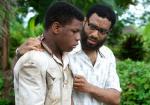
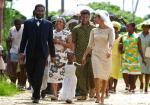
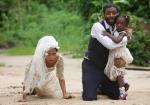

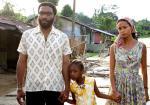
What was the hardest scene to shoot ? Quelle a été la scène la plus difficile à tourner ?
Well it was just a very intense production, the actors we’re really into it. Everyday was different, and the way I see it every scene was very important because if one scene doesn’t work it affects everything else. In a way I was rewriting the book for it to fit the characters. The whole process and making of is just amazing because I adapted it from a book. The thing with cinema is first you write a script, then you shoot and in a way when you’re shooting the film you are rewriting it because you don’t have everything when you’re home in front of your computer, you don’t even have the actors (laughs) ! And then when you’re shooting, you get to know the actors and think « this could be better » and then you change some aspects, you rewrite. And then comes the editing part, you start rewriting again for the third time, a scene that was number 2 in script 2 becomes scene 10. It’s a long journey ! Ça a été une production très intense, les acteurs étaient vraiment à fond. Chaque jour était différent et je pense que toutes les scènes sont importantes parce que si une scène ne fonctionne pas, cela affecte tout le reste. D’une certaine manière, on peut dire que j’ai dû réécrire le livre pour qu’il s’adapte aux personnages. Comme il s’agit de l’adaptation d’un roman, tout est différent durant le processus de tournage et de montage. Dans le cinéma, d’abord tu écris un scenario, ensuite tu tournes et d’une certaine façon pendant le tournage tu réécris l’histoire, parce qu’ à la maison devant ton ordinateur tu n’as rien, tu n’as même pas les acteurs (rires) ! Par la suite, quand tu tournes, tu apprends à connaître les acteurs et tu te dis, « ça pourrait être mieux » et là tu changes certaines choses, tu écris à nouveau. Puis il y a la partie édition, où tu écris une 3ème fois. La scène qui été numéro 2 dans le script 2 devient scène 10 par exemple. Oui, c’est un long chemin !
The movie had its premiere in London, Toronto, Lagos, Paris, Dubai, etc. What was the general feedback, reactions and atmosphere of the audience ? Le film a eu ses avant-premières à Londres, Toronto, Lagos, Paris, Dubaï etc. Quelles ont été les retours, ou réactions dans les salles ?
It’s been completely astonishing, audiences reponded really really well to it. On the other side, the critical reviews were divided, sometimes I felt like they wanted to linch me or bury the movie alive because they didn’t know what to do with it. Fortunately for me, the audiences are just like amazing. « Half of a yellow sun » opened in the UK three months ago and is still palying. Normally you can only say that when you’re a hollywood movie and have spent million dollars promoting. People are even going back to see it and I feel very lucky. Someone told me it was the work of a genuis and another one it was a complete desaster in the same day, you know you get everything. And it’s great, meaning that people are not in different to it ! The people responded really really well, I was in Zanzibar last week where it won an award for BEST FEATURE FILM at the Zanzibar International Film Festival. The movie was projected in a amphiteater, a big open space with 6000-7000 people not to mention the phones ringing, people talking, or eating. Then at the back some others selling ice-creams, coffee, cigarettes, and other stuffs, you know, in the African kinda way, and I loved it !
The audience reacted really strongly when a scene would come up they’d go like « No no not that way » pointing fingers to the other side (laughs). I was watching them from the back and it was really funny. I didn’t introduced the movie before it started and I was walking freely around the place and all these kids kept calling me Bandela, refering to MANDELA, my name is Biyi Bandele but they just kept saying BANDELAAAA BANDELLLLAAA it was so funny !
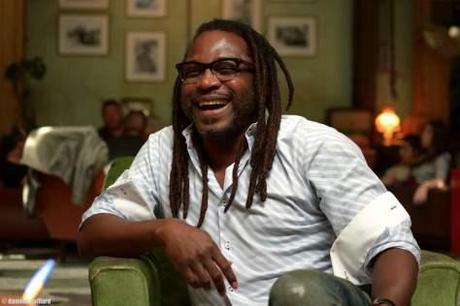
I also went to Dubai and to India, where I was the only black person in the audience and I was worried because people were so quit during the movie. And then an indian woman came up to me, she was about 21 or 23 years old I think, and said she was threatned to come see the movie because she read the book and loved it so much, then asked for a hug. You see people react differently, she wasn’t nigerian but she had read the book. The story speaks to people everywhere and it’s great. Sometimes in african movies, when white people go to see them, they’re not sure when to laugh. They need permission and that is also funny (laughs) ! Ça a été ahurissant, les spectateurs ont très bien réagi. Les critiques ont été divisés, j’ai parfois eu le sentiment qu’on voulait me lyncher et enterrer mon film parce qu’ils ne savaient pas quoi en faire. Heureusement pour moi, les spectateurs sont incroyables. Le film a commencé à être diffusé au Royaume Uni il y a 3 mois et il est encore en salle. Normalement, il n’y a que les films d’Hollywood qui peuvent se vanter de faire cela, des films pour lesquels sont dépensés des millions de dollars en promotion. Les gens retournent même le voir, je suis très chanceux. Quelqu’un m’a dit dans une même journée que c était le travail d’un génie, un autre que c’était un vrai désastre ! Il y’a de tout, vous savez. C est génial parce qu’au moins les gens ne sont pas indifférents. Ils réagissent plutôt bien. J’étais à Zanzibar la semaine dernière où le film a reçu une récompense pour « meilleur film » au festival international du film de Zanzibar. « Half of a yellow sun » a été projeté dans un amphithéâtre, un espace ouvert avec 6000 à 7000 personnes qui parlaient, téléphonaient, mangeaient. A l’arrière il y avait des gens qui vendaient des glaces, du café, des cigarettes et encore plein d’autres trucs. Vous savez, à la manière africaine et j’ai adoré. Pendant la projection, ces gens ont eu des réactions très vives et ils disaient à chaque scène imminente « non, non pas là, pas là » en pointant du doigt à l’opposé de l’écran.
Je les observais de l’arrière et je trouvais ça très drôle. Je n’avais pas présenté le film avant le début de la projection, je marchais donc librement dans la foule. Les enfants n’arrêtait pas de m’appeler BANDELA, en faisaient référence à Mandela, mon nom est Biya Bandele mais ils n’arrêtaient pas de m’appeler Bandela, Bandelaaaa !! C’était juste très drôle.
J’ai aussi été à Dubaï et en Inde où j’étais le seul noir dans la salle. Une jeune femme indienne, qui avait dans les 21-23 ans est venue me voir pour me dire qu’elle avait peur de venir voir le film car elle avait lu le livre qu’elle avait adoré. Puis elle m’a demandé de lui faire une accolade. Les gens réagissent différemment, elle n’était pas nigériane mais avait lu le livre. Partout, l’histoire parle aux et c est génial. Parfois dans les films africains, quand les blancs vont les voir, ils ne savent pas quand ils peuvent rire. Ils ont en quelque sorte besoin de permission et ça aussi c’est drôle.
What are you working on right now ? Vous travaillez sur quoi en ce moment ?
I’m about to go shoot a film in Lagos, a very small one about 4 women… a story I wrote because you know that’s what I do and I love writing. I can’t say more for now. Je m’apprête à aller tourner un film à Lagos, un petit film sur 4 femmes, une histoire que j’ai écrit parce que c’est ce que je fais, n’est-ce pas ! Je ne peux pas vous en dire plus pour le moment… 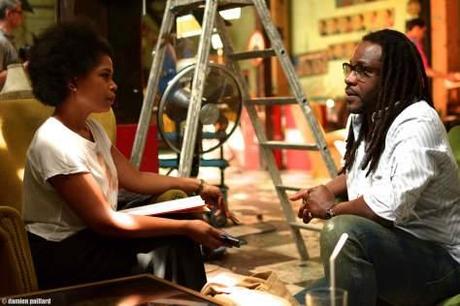
200 school girls abducted by Boko Haram and even more. What is your point of view about the situation and tribal tensions in Nigeria ? 200 filles ont été kidnappées par Boko Haram , qu’elle est votre point de vue sur la situation et les tensions entres éthnies au Nigeria ?
On the one hand Boko Haram comes from inequalities that you have in nigerian society. One of the richest man in the world is Aliko Dangote, he is from the north. The northern Nigeria also happens to be the poorest part of Nigeria, also know for low access to education. How I reason it, it’s got so much iliteracy because the modern elite actually doesn’t seem to be in the interest of it. They’s a lot of poverty from one state to another, but the people that BH are killing comes form the same class as theirs, Boko Haram is not attacking the soldiers for example. I think the nigerian governement should negociate with these people, I think Jonathan Goodluck is refusing to negociate, the americans negociated in some level with Al Qaida, we know how it goes. I hope that he’s not doing in private, what he’s saying in public. Everyone is saying go get the girls go get the girls, the only way we could get the girls is by sending a bunch of soldiers with guns, that also meaning the girls will die, you can’t just go there and say these are the girls, these are the terrorists. Boko Haram does not have a unity, it’s not an army, they dresses like anybody in the streets. You can’t even recognized dead bodies laying on the roads, either if they’re Boko Haram or ordinary people targetad because they happen to be in the part of Nigeria where Boko Haram is. It’s a really really tough situation and Nigeria is a very big country with 170 million of us inside the country and between 20 or 30 million outside. It’s a lot of people but the solution would not be a military one but political, and another thing about Boko Haram is that they do not have a politician wing…. We could keep talking for hours about Boko Haram you know, it’s just a very tough thing.
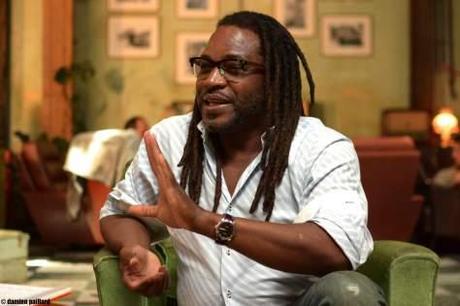
Photos ©Damien Paillard
 Half Of A Yellow Sun - a film adaptation of celebrated author Chimamanda Ngozi Adichie, already out in theaters in the UK and the USA was screened at the NollywoodWeek festival in Paris, last month. It’s an epic love story that weaves together the lives of four people swept up in the turbulence of civil war, during the struggle to establish an independant republic in Nigeria. We had the chance to meet its director, Biyi Bandele who came to Paris for the Black Movie Summer Festival. Our conversation was mainly about its adaptation of the novel, to the film and political reality in Nigeria.
Half Of A Yellow Sun - a film adaptation of celebrated author Chimamanda Ngozi Adichie, already out in theaters in the UK and the USA was screened at the NollywoodWeek festival in Paris, last month. It’s an epic love story that weaves together the lives of four people swept up in the turbulence of civil war, during the struggle to establish an independant republic in Nigeria. We had the chance to meet its director, Biyi Bandele who came to Paris for the Black Movie Summer Festival. Our conversation was mainly about its adaptation of the novel, to the film and political reality in Nigeria.